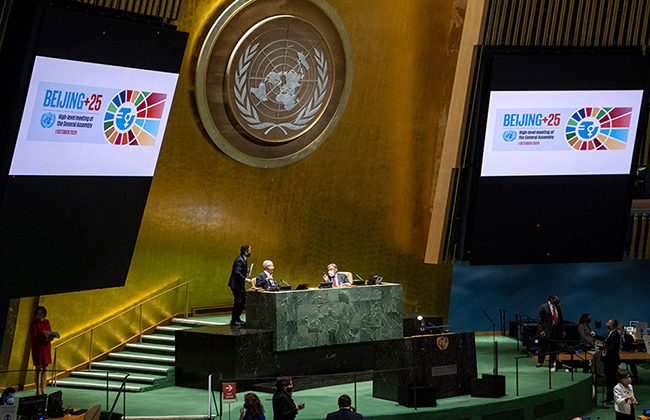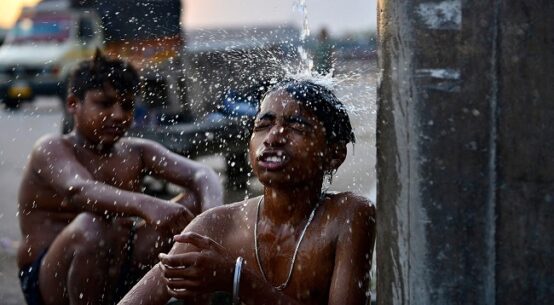
When the UN’s high-level meeting of world leaders concluded last week, the head count seemed lopsided: 190 speakers, including 76 Heads of State, 50 Heads of Government, 4 Vice-Presidents, 5 Deputy Prime Ministers, 48 Ministers and 7 Heads of Delegations—overwhelmingly male.
Among the 190 speakers, there were only 23 women, “a figure that represents around 10 per cent of leaders who participated this year”, according to the UN.
The President of the General Assembly Csaba Kőrösi of Hungary struck a note of political consolation when he said: “But though their numbers are small, women leaders “pack a punch”, to quote former New Zealand Prime Minister Helen Clark, who moderated this year’s first General Assembly Platform of Women Leaders”.
But the reaction from rights activists and civil society organizations (CSOs) was mostly negative.
Antonia Kirkland, Global Lead on Legal Equality at Equality Now told IPS “the dismal number of women leaders speaking at UNGA this year is very worrying given the regression on women’s rights in many parts of the world, including in the United States, where the UN General Assembly meets”.
There is a well-documented correlation, she said, between peace and security generally, economic development and women’s rights, which has an impact on everyone.
“The low number of female leaders speaking at UNGA is less than half the already low number of women parliamentarians worldwide (just over 26% according to IPU).”
“And as it becomes harder and harder for civil society to access the United Nations, women’s rights organizations have less of an opportunity to hold governments accountable to their legal obligations and commitments to ensure gender equality,” Kirkland declared.
The criticisms come amid longstanding complaints of how women are marginalized in the highest levels of the UN since its creation.
The male/female ratio for the Secretary-General stands at 9 vs zero. And the Presidency of the General Assembly (PGA), the highest policy-making body at the UN, is not far behind either.
The score stands at 73 men and 4 women as PGAs– even as the General Assembly elected another male candidate, as its 77th President, and who serves his one-year term beginning September 2022.
Since 1945, the only four women elected as presidents were: Vijaya Lakshmi Pandit of India (1953), Angie Brooks of Liberia (1969), Sheikha Haya Rashed Al-Khalifa of Bahrain (2006) and Maria Fernando Espinosa Garces of Ecuador (2018).
Meanwhile, women Heads of State and Government met on the sidelines of the UN General Assembly (UNGA) High-level Week to discuss global issues in the newly created UNGA Platform of Women Leaders.
The event, under the theme of “Transformative solutions by women leaders to today’s interlinked challenges”, highlighted the fact that women’s full and effective political participation and decision-making are crucial to addressing global priorities effectively, decisively, and inclusively, according to UN Women.
With the presence of President Katalin Novák of Hungary, Prime Minister Sheikh Hasina of Bangladesh, Prime Minister Katrín Jakobsdóttir of Iceland, Prime Minister Fiamē Naomi Mataʻafa of Samoa, and Prime Minister Robinah Nabbanja of Uganda, as well as Prime Minister Evelyna Wever-Croes of Aruba and Prime Minister Silveria E. Jacobs of St. Maarten, and former Prime Minister Helen Clark of New Zealand, the event was hosted by the Office of the President of the General Assembly and UN Women, in cooperation with the Council of Women World Leaders (CWWL).
Purnima Mane, a former Deputy Executive Director of the UN Population Fund (UNFPA) and UN Assistant-Secretary-General, told IPS that in June 2022, the UNGA passed a resolution commemorating the International Day of Women in Diplomacy which acknowledged the contribution of women globally at all levels of decision making who work for the achievement of sustainable development, peace and democracy.
“And yet, we recognize that women are grossly under-represented at most levels in the UN including national delegations and senior levels of the diplomatic corps.”
While women’s political representation at senior levels is on the rise in many countries over the last few years, especially women serving as heads of State, she pointed out, it still has a long way to go with only 28 of the 193 Member states having Women heads of State of government.
This low representation of women was evident in the recent UNGA session, she said.
Of the 190 speakers, 23 were women, a figure that represents around 10 per cent of the leaders who participated this year – a number that is still “woefully low”, said Mane, a former President and CEO of Pathfinder International
It is significant, she said, that many of this small group of women leaders “pack a punch” as stated by former New Zealand Prime Minister Helen Clark, who moderated this year’s first General Assembly Platform of Women Leaders.
At this newly launched General Assembly Platform of Women Leaders, the female heads of State of several countries like Aruba, Bangladesh, Hungary, Iceland, St. Maarten, Samoa and Uganda, addressed the group.
“Undoubtedly this comment from Former New Zealand PM Clark gives us pause to think. It is true that some of the women leaders like those of Finland and many other Member States, have caused the world to sit up and take notice of their achievements.”
Many of the countries with female leadership are making a difference at the country level, focusing on gender equity and ensuring laws and policies which foster these.
“These countries are also doing better in terms of development goals and making a difference in their region as a whole, also inspiring women around the world to recognize their potential. Imagine what the world would be like if this number of women leaders increased significantly, to the benefit of not just their countries, but also their regions and the world,” she added.
The actions these women leaders have taken speak for themselves – they are pioneering and have yielded much-needed benefits, said Mane.
“Data are plentiful to show what a difference these women leaders are making both domestically and internationally. Yet their numbers grow far too slowly”.
“While numbers do not tell the whole story, they certainly indicate the source of the problem, and the world loses out in moving faster towards development and greater equity,” she declared.
Addressing the meeting of women leaders, Sima Bahous, Executive Director of UN Women, said: “When more women lead in political and public life, everyone benefits, especially in crises”.
A new generation of girls see a possible future for themselves. Health, education, childcare, and violence against women receive greater attention and better solutions.
“We must find every possible way to amplify the assets women leaders bring. This Platform is an opportunity to do just that.”
Recent global crises, such as the COVID-19 pandemic, climate, and conflicts, have shown the positive difference women’s leadership and decision-making can make in executive positions, parliaments, and public administration, she said.
For example, the UNDP–UN Women COVID-19 Global Gender Response Tracker shows that governments with higher women’s representation in parliaments adopted a higher number of gender-sensitive policy measures in response to COVID-19, including policies aimed directly at strengthening women’s economic security.
Out of the 193 Member States of the United Nations, only 28 women serve as elected Heads of State or Government, she pointed out.
Whilst progress has been made in many countries, the global proportion of women in other levels of political office worldwide still has far to go: 21 per cent of the world’s ministers, 26 per cent of national parliamentarians, and 34 per cent of elected seats of local government.
According to a new UN report, at the current pace of progress, equal representation in parliament will not be achieved until 2062, said Bahous.
Katrín Jakobsdóttir, Prime Minister of the Republic of Iceland and Chair of the Council of Women World Leaders, said: “It is my strong belief that the world needs more women leaders and more diverse leaders, people with all kinds of backgrounds and life experiences”.
“The decisions leaders make affect all people in our societies. These decisions should be made by people who have a real and deep understanding of how most people live, of what their concerns are, and are therefore responsive to their needs.”
Thalif Deen is IPS UN bureau chief and regional director North America. He has been covering the UN since the late 1970s. A former deputy news editor of the Sri Lanka Daily News, he was also a senior editorial writer on the Hongkong daily, The Standard.


